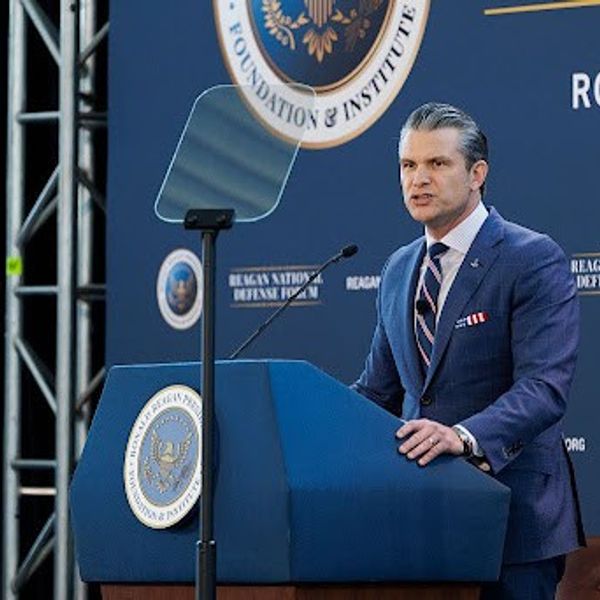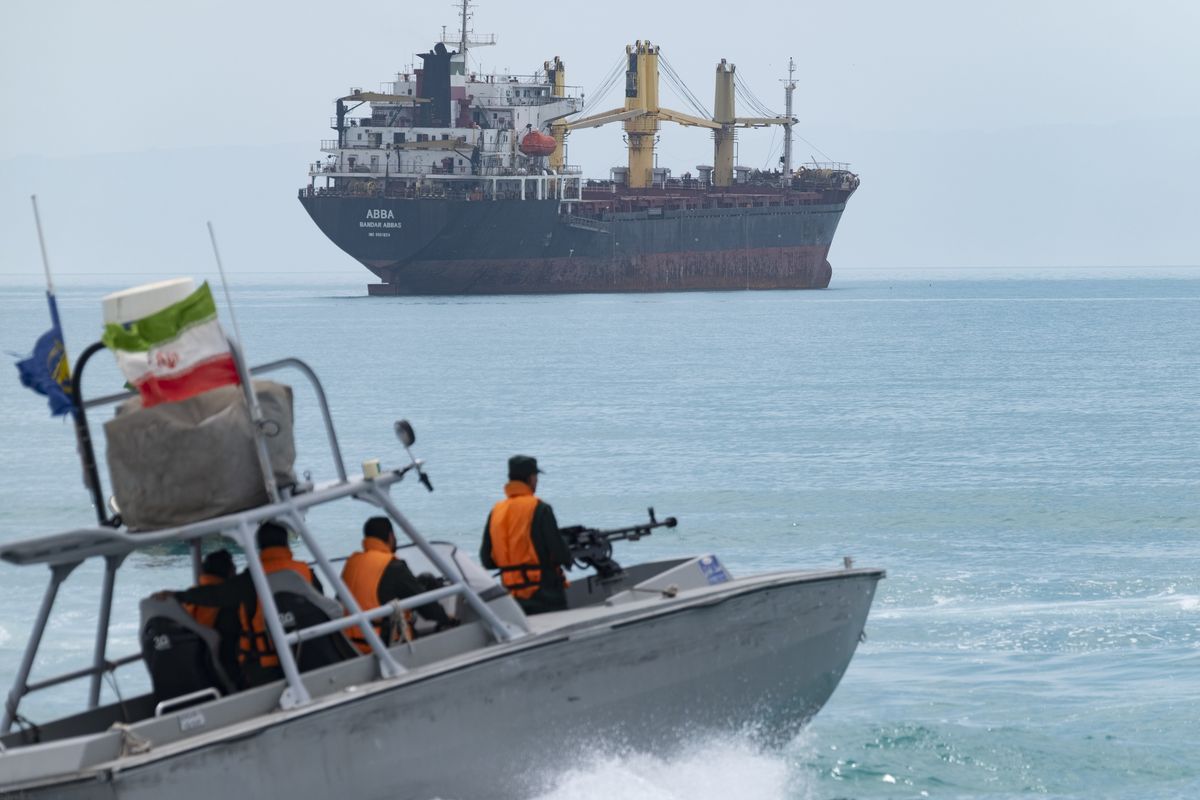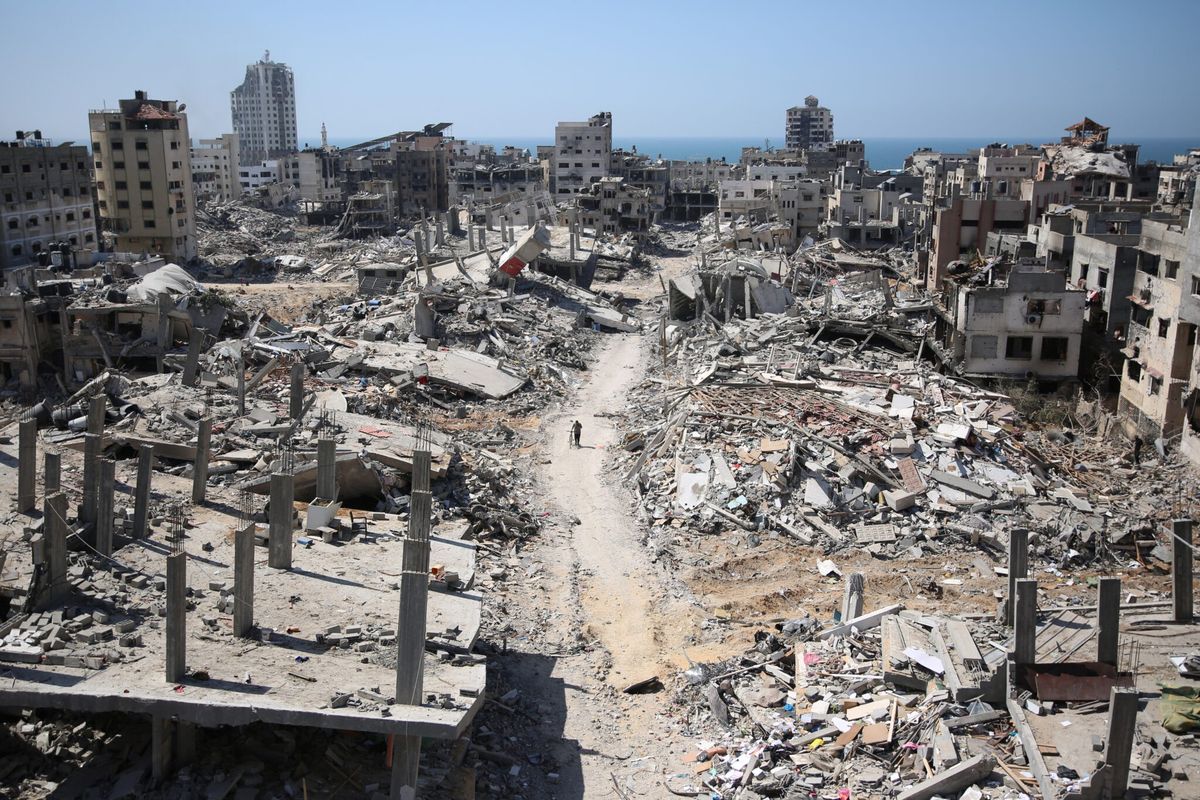OPINION — The Palestine National Authority (PNA), the interim body created after the 1993 Oslo Accords to administer Palestinian-populated areas of the West Bank and Gaza Strip, “is crumbling…It does need to regain its standing with its people. And I think the only way that can happen is if that, in addition to reforms which are essentially within the PNA, but also an ecosystem that enables it to go to its people and say: ‘Look, there is hope for you. And I will deliver this endgame for you, which means your security, and your statehood, and your freedom.’”
Those are the words of Ayman Safadi, Jordan’s Deputy Prime Minister and Minister of Foreign Affairs, in a conversation last Wednesday at the Center for Strategic and International Studies (CSIS}.
As the fighting in Gaza rages on with Israeli troops seeking to destroy Hamas and its terrorist organization in response to their horrific attack against Israelis on October 7, Safadi’s views of how we got to this situation and what should follow are worth reviewing — for one key to the future is credible, legitimate Palestinian leadership that can govern a post-Hamas Gaza and forge a broader two-state solution with Israel including the West Bank.
First, however, there should be recognition that since the Trump-initiated Abraham Accords in 2020 between Israel and several Arab countries, the Palestinians have been ignored. The same was true when the Biden administration began negotiating with Israel and Saudi Arabia for re-establishing diplomatic relations between Riyadh and Jerusalem. Talk of a two-state solution for Palestine vanished.
It's not just for the President anymore. Are you getting your daily national security briefing? Subscriber+Members have exclusive access to the Open Source Collection Daily Brief, keeping you up to date on global events impacting national security. It pays to be a Subscriber+Member.
On September 22, when Israel’s Prime Minister Benjamin Netanyahu spoke to the United Nations General Assembly in New York, he used a map entitled "The New Middle East" that did not contain an area or country called Palestine. Netanyahu used the map to show the number of Arab countries that had normalized relations with Israel. It also showed the West Bank and Gaza as part of Israel.
He told the General Assembly, "There's no question the Abraham Accords heralded the dawn of a new age of peace, but I believe that we are at the cusp of an even more dramatic breakthrough, an historic peace between Israel and Saudi Arabia. Peace between Israel and Saudi Arabia will truly create a new Middle East."
Netanyahu then talked of achieving peace “with our Palestinian neighbors, but with a caveat.” The caveat was that “the Palestinian Authority must stop glorifying terrorists…and stop giving money to Palestinian terrorists for the murder of Jews, this is outrageous. It must stop for peace to prevail.”
Netanyahu followed by calling on the Palestinians to reconcile themselves “not only to the existence of the Jewish State, but to the right of the Jewish people to have a state of their own in their homeland, the land of Israel.”
He made no mention of Palestine or the homeland of the Palestinians.
In fact, as New York Times columnist Tom Friedman pointed out last Wednesday, since they came to power last December, “the Jewish supremacists in Netanyahu’s cabinet…began taking steps to impose much harsher conditions on Palestinians from the West Bank and Gaza held in Israeli jails. And it laid plans for a huge expansion of Israeli settlements in the West Bank to prevent a contiguous Palestinian state from ever coming into being there. This is the first Israeli government ever to make [Israeli] annexation of the West Bank a stated objective in its coalition agreement.” [emphasis added]
Prior to the Trump Abraham Accords, most of the Arab countries had conditioned recognition of Israel on establishing a viable Palestinian state with East Jerusalem as its capital, as articulated in the Saudi-brokered Arab Peace Initiative that was endorsed by the Arab League in March 2007.
With Netanyahu’s Jewish supremacist government moving against Palestinians, international negotiations were underway, without Palestine representation, to establish relations between the Saudis and Israelis. At the same time, Hamas in Gaza prepared and then undertook the unexpected October 7, slaughter of at least 1,400 Jewish men, women and children.
It became a bloody reminder, particularly for the leaders of Arab nations, that they cannot ignore the plight of the Palestinians as continuing mass pro-Palestine demonstrations in the Middle East and around-the-world have since shown.
At the CSIS meeting last Wednesday, Jordanian Foreign Minister Safadi focused on the current Israeli response saying, “Nobody in their right mind wouldn’t condemn the atrocious scenes that we’ve seen [caused by Hamas terrorists], but people are asking legitimate questions. Is this war going to end this or is it going to lead to more of this? What about the 6,000 Palestinians who have died [from the Israeli response] in the days since this terrible nightmare engulfed all of us? They have families, too. They have names. You know, they have faces. They have memories.”
He also pointed out, “Hamas is not an army that is in charge of a specific piece of land that the Israeli army can go and engage army-to-army and end this war…Let’s say Israel goes into Gaza and kills everybody who ever uttered the word Hamas from three years old to 100 years old, kill a 100(,000), 200(,000), 300,000. You’re going to be left with two million people [in Gaza]. What are you going to do with this? So, I think we have to ask the tough questions. We have to ask, you know, what kind of Gaza would be left once this military operation ends? And, again, is it going to be leading to creating conditions where people will be in a position to celebrate peace and move forward, or will the conditions of misery and occupation and lack of opportunity be conducive to the creation of even more violently inclined groups of peoples? These are – these are real questions.”
Aaron David Miller is a Senior Fellow at the Carnegie Endowment who served in government between 1978 and 2003 and helped formulate U.S. policy on the Middle East and the Arab-Israel peace process. He posted to the social media platform known as X last Friday, that “Whatever plan the [Biden] Administration conceives for the day after in Gaza will ultimately be framed by an initiative to deal with Israeli-Palestinian peace. You need serious Israeli and Palestinian leaders to make it real. And to say least they are MIAs [Missing-in-Action].”
As Jordanian Foreign Minister Safadi noted above, the Palestinian Authority “is crumbling.” There have been no presidential elections since 87-year-old, incumbent Mahmoud Abbas was elected in 2005, and no parliamentary elections since 2006.
Abbas’ Fatah Party split from rival group Hamas in 2006, in part because the Abbas faction agreed to recognize Israel and Hamas did not. In 2007, Hamas took over Gaza. When Abbas’ four-year term ended in 2009, Hamas declared Abbas illegitimate. Abbas argued that he should stay in post for a further year, so presidential and parliamentary elections could be held at the same time. To this day, he remains in post.
Hamas has since run Gaza with an iron fist. Meanwhile, Abbas’ Palestinian Authority (PA) in the West Bank, with support from the U.S. and European countries, has ministries and a civil service, but Israel wields the real power, controlling tax revenue and access to territories.
Among Palestinians, the PA administration is viewed as corrupt and its reputation was diminished further when Abbas called off elections in 2021, fearing his Fatah Party would lose to Hamas.
Safadi said at CSIS, “I think it is in everybody’s interest to empower the [PA]…and, again, I know everybody here talks about reform. And we agree. And I think the Palestinians themselves see the need for that reform.”
Tom Friedman put it more bluntly: “There will also be no hope for that [a Palestine State] if Palestinians in the West Bank and around the world don’t insist on building a more effective, non-corrupt Palestinian Authority. That is long past due — and it is not just Israel’s fault that it has not happened. Palestinians have agency too.”
On the Israeli side, there is also the problem of who can represent the Israeli people in any future post-Gaza war negotiations with the Palestinians.
Safadi, after mentioning two Israeli members of the current Netanyahu government “who want to wipe the Palestinians off the face of the Earth,” then asked, “Are we going to let those dictate the agenda for us? Are we going to let this narrative define who we are and define what kind of future we will leave for the future generations?”
In essence, Safadi recognized, “On both sides you have – you have people who do not recognize the other. On both sides, you have people who want to believe war is the right approach. But I cannot believe that the majority of both sides, because they’re humans by the end of the day, don’t want this. They want peace.”
Safadi then said, “People now are thinking of the immediate, the bombings and the killings…The residue of this is going to be a tremendous amount of lack of trust and hatred.” But, he added, “To navigate through that, you’re not going to do it with guns and bullets. We have to do it with ideas, ideas that resonate with both people, ideas that convince the Palestinians that you have a future, that convince Israelis that you can live in peace only if that happens. Israelis will have peace and security when the Palestinians have peace and security.”
I don’t know what’s going to happen, but Jordan’s Foreign Minister Safadi is from the region and knows the players, so I hope he is right about what could take place.
The Cipher Brief is committed to publishing a range of perspectives on national security issues submitted by deeply experienced national security professionals
Opinions expressed are those of the author and do not represent the views or opinions of The Cipher Brief
Have a perspective to share based on your experience in the national security field? Send it to Editor@thecipherbrief.com for publication consideration
Read more expert-driven national security insights, perspective and analysis in The Cipher Brief














